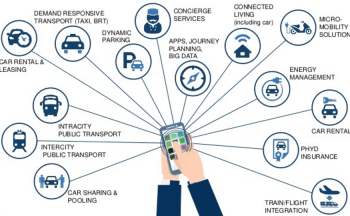 April 2020
April 2020
Tomorrow has arrived. How it will affect our city and condo infrastructure remains unclear.
The largest hotel company in the world, Airbnb, is a software application that does not own properties. The biggest taxi company in the world, Uber, is a software application without a fleet of automobiles. Taxi medallions, once worth hundreds of thousands of dollars, are virtually worthless. Nobody anticipated these changes or their ability to disrupt long established industries.
Computers are better able to “understand” and react to the environment. We call this artificial intelligence.
Artificial intelligence allows us to obtain legal advice from a computer with 90 percent accuracy – an improvement over the 70 percent accuracy of lawyers – for basic matters. With continued improvement of technology there will be fewer lawyers in the future. Cancer diagnoses by technology are four times more accurate than those of medical practitioners. Facebook can recognize faces faster and more accurately than people. Innovative companies are working to develop products based on artificial intelligence for use in the condo marketplace.
The Tricorder, popularized in Star Trek, exists today. It works with your phone; takes a retina scan, breath sample and blood sample. It analyzes over 50 bio-markers and can identify most diseases.
We are just beginning to understand artificial intelligence and 3D printing. Their impact on electric and autonomous vehicles is just beginning.
Self-Driving and Electric Vehicles
Self-driving or autonomous cars exist today. As the technology is perfected we may no longer choose to drive a car. It will be easier to “call” a car that will arrive at your location and drive you to your destination. There will be no need to have a driver’s license, find a parking space or pay for parking. Distracted or impaired driving will no longer be possible. Automobile insurance will be unnecessary and vehicle maintenance will be someone else’s responsibility. This will change our cities as 90 percent fewer cars will be needed. Cities will be quieter and cleaner. Underground condo parking spaces will have to be repurposed or be unused.
Many of those born in 2019 will rely entirely on mass transit, short-term vehicle rentals and uber-type services. They will never own a personal automobile nor have need for a driver’s license.
Traditional automobile companies are evolving to build better electric vehicles – Volvo has discontinued production of vehicles with an internal combustion engine in place of electric and hybrid vehicles. Technology companies – including Tesla, Google and Apple – are striving to build a computer on wheels.
Electric vehicles are a part of our future. The only question left to ask is when.
Gas stations may disappear to be replaced with meters that dispense electricity at parking spaces in residential and commercial buildings, at retail locations and on city streets. Companies have begun installing electric vehicle charging stations at these locations.
Automobile manufacturing jobs have begun to disappear. Some will be replaced as electric vehicle manufacturing grows although it is far from certain these jobs will exist in Ontario.
Electricity Production
Some believe we will become less dependent on oil and coal.
Home, particularly high-rise buildings, may soon produce and store more than enough electricity for their own use while selling excess production to the electrical grid for use by those needing to purchase electricity. The technology is currently used on some automobile roofs and parking meters to provide power.
This has happened before. In 1998 Kodak employed 170,000 people and sold 85 percent of photo paper worldwide. Digital cameras, invented in 1975, competed with Kodak for 25 years. The first camera phone was introduced around 2000 – by the end of 2003 over 80 million had been sold. Soon after nearly all of us were taking pictures with our smartphone and no longer required a digital camera, film or developing services. Kodak soon went bankrupt and the digital camera industry was in decline. Few understood the impact of technology and software on the photography industry. Nobody saw this change coming.
By 2030 this future will likely be much clearer.







